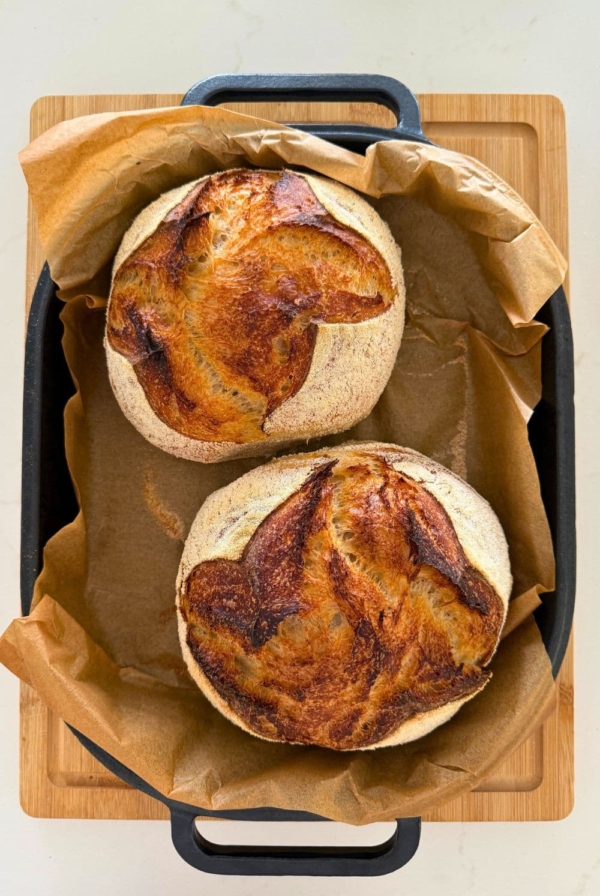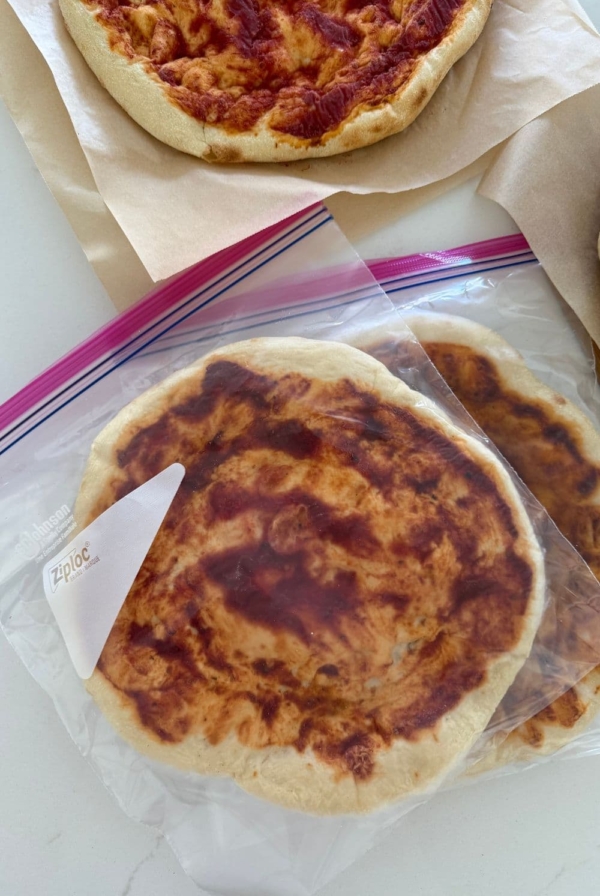This post contains affiliate links. Please see our disclosure policy.
Ever wondered about adding vital wheat gluten to sourdough?
Could vital wheat gluten (VWG) be the secret sauce for consistently good sourdough? Or is it only necessary in certain scenarios?
This blog will answer all your questions about Vital Wheat Gluten and how to use it in your sourdough baking.
Table of Contents
- What is Vital Wheat Gluten?
- How does Vital Wheat Gluten work in sourdough?
- Why Add Vital Wheat Gluten to Sourdough?
- How To Add Vital Wheat Gluten To Sourdough
- How Much Gluten Do I Add To Flour For Sourdough Bread?
- What Happens if You Don’t Have A Good Gluten Network
- Can You Add Vital Wheat Gluten to Sourdough Starter?
- Can I Add Vital Wheat Gluten to All Purpose Flour?
- Further Reading
What is Vital Wheat Gluten?
Vital Wheat Gluten (VWG) is basically made from gluten, the main protein in wheat.
It’s made by washing the wheat flour dough with water until all the starch granules have been removed.
It can be added to All Purpose or Plain flour to increase protein levels and gluten development.
It is not actually a flour itself and cannot be used to bake with alone.

Wheat Gluten is not just used in baking bread.
VWG can be cooked as a meat alternative in vegetarian or vegan diets. It’s also a popular alternative to soybean based foods like tofu in Asian countries.
When used in this way it is referred to as seitan.
When you add vital wheat gluten to sourdough bread, it is considered vegan friendly sourdough, so long as the other ingredients are also plant based.
How does Vital Wheat Gluten work in sourdough?
Vital Wheat Gluten is used in sourdough baking to increase the protein content in flour.
It helps to provide structure to the bread by adding more gluten, thus building up the gluten network which is necessary to support all the gas bubbles produced by your starter.
When making sourdough, you’re always aiming to have an adequate gluten network before you go into the bulk ferment stage. That is why stretching and folding your dough is so important.
You can check the gluten development of your dough using the window pane test.
If you don’t have an adequate gluten network, your dough will collapse and won’t be able to hold onto all of the gas.
This will have a negative impact on your oven spring, making your dough gummy and dense. It can also cause your loaf to collapse after cooling.
You can read more about how the gluten formation affects your sourdough oven spring here.

Why Add Vital Wheat Gluten to Sourdough?
Vital Wheat Gluten is not necessary or essential in sourdough baking.
You can make perfectly delicious bread without it, particularly if the flour you are using is already high in protein.
It can be handy, however, in a few different scenarios:
- You can increase the protein content of All Purpose or Plain flours with vital wheat gluten. Use around 10-15g per 500g of flour (2%).
- You can use VWG in a rye or whole wheat bread. These flours typically have trouble developing gluten (and don’t often get the same rise as good old bread flour). Adding VWG can help to overcome this issue by providing a boost of gluten to your bread.
- Add VWG to sourdough recipes with lots of nuts, seeds and/or fruit. Recipes like this delicious Coffee & Maple Infused Date Sourdough Bread use Vital Wheat Gluten to help the structure of the bread. It also gives the bread the most delicious crust.

You can also add vital wheat gluten to Bread Flour if you want to.
It will create a very high protein flour.
Sourdough is all about experimenting and finding out what works for you, so it’s definitely worth doing to see if you like the effect the Vital Wheat Gluten has on your dough.
You could add 10-15g to this basic sourdough recipe and see what happens.
How To Add Vital Wheat Gluten To Sourdough
When you use vital wheat gluten, you need to add it to your flour first. You don’t need to sift it or anything, however you want to make sure it’s incorporated well.
A good mix through with a spoon is fine. You can then add flour to your dough as you normally would, for example, at autolyse.
Your dough will start to develop the gluten network as soon as water is mixed into the flour, so you always want to add the Vital Wheat Gluten at the very start of the sourdough process.
How Much Gluten Do I Add To Flour For Sourdough Bread?
As a general rule, you would use around 10-15g per 500g of flour (2%).
This works for All Purpose flour, whole wheat flour, rye flour – any type of flour that you would normally use in sourdough bread.
What Happens if You Don’t Have A Good Gluten Network
While vital wheat gluten is not essential, so long as the flour you are using has a high protein content, a good gluten network is necessary.
If you do not develop the gluten adequately, you will not get good oven spring – and really this is the aspiration of most sourdough bakers, right?
If you’d like to read more about how gluten development affects oven spring, as well as the other factors that come into play, you can read more here.
Can You Add Vital Wheat Gluten to Sourdough Starter?
There is no need to add vital wheat gluten to your sourdough starter. Of course, yes you can add it, but it will not give you any added benefit to using just flour alone.
Your sourdough starter is a collection of complex bacteria and yeast. They feed off the flour and water you add to the jar. They do not benefit from added gluten.
Your dough on the other hand may benefit, as explained above.

Can I Add Vital Wheat Gluten to All Purpose Flour?
Yes you can! Adding vital wheat gluten to all purpose flour will essentially make homemade bread flour. This is a great way to make sourdough if you don’t have any higher protein bread flour on hand.
If you use all purpose flour to make sourdough, you will often have to make allowances for reducing the water content (overall hydration) so that the dough is easier to handle.
Adding vital wheat gluten to all purpose flour means you will not have to decrease the hydration of your sourdough.
It will increase the extensibility of your dough and make it easier to work with.

Further Reading
If you enjoyed this article about adding vital wheat gluten to sourdough bread, you might enjoy these:
- You’ll find information about using diastatic malt powder in sourdough here.
- Learn about sourdough hydration and how it can affect bulk fermentation.
- Want to increase your oven spring exponentially? These tips will help!
- Nail that sourdough ear. This guide will get you baking the sourdough ear you’ve always dreamed about.










Where would one obtain VWG?
You can buy it from most health food stores or online (Amazon).
When adding gluten to sourdough and dealing with hydration levels would you also want to add some water to the recipe?
When you add vital wheat gluten to a sourdough recipe, do you decrease the flour by the same amount? Thank you
no, there’s no need to reduce your flour since VWG is not actually flour. You just add it in addition to 🙂
Hi, I was wondering if you’re making a 50/50 (bread flour/whole wheat) would you only add enough vital wheat gluten for the weight of the whole wheat or for the total weight of both flours? Thanks!
Does the fermentation time need to be increased to allow for the digestion of extra gluten by the yeast and LAB?
I’m planning on making your sourdough rye bread recipe; how much of the vital gluten do I use ?
I haven’t been able to find a lot of information on Vital Wheat Gluten.
I appreciate what you have shared.
I am in Australia and what I can get at the supermarket:
All Purpose Flour per 100g is 10g
Bakers Flour per 100g is 11.5g
I am trying to find out how much gluten to add to boost up the protein to 13g per 100g
The info I have found so far don’t share what the protein of their flour is before they start adding gluten.
I just want to try work out how much VWG to add to 100g of my All Purpose Flour to get the protein from 10g to 13g
Maybe I just haven’t asked google the right question.
Just add 10g to 500g of your Bakers Flour and you should be sweet 🙂 See how it goes and then adjust it from there 🙂 You can’t really go wrong with it. If the dough is too tight when you try to stretch and fold, you know to add less next time 🙂 Hope that help xo